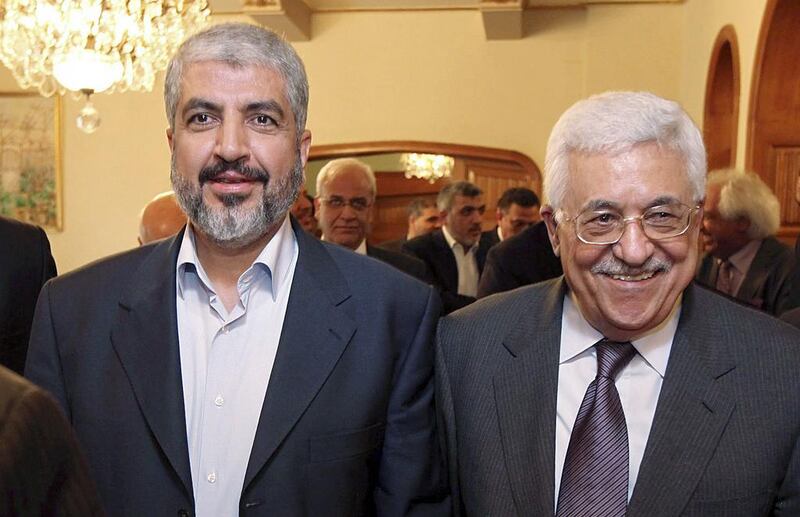BEIRUT // The Palestinian unity government was under the threat of falling apart after the Palestinian Authority president accused Hamas of obstructing its implementation.
Mahmoud Abbas, who is also the chairman of Fatah, which along with Hamas makes up the government, criticised Hamas for preventing an interim government that was formed by both factions in May from operating in Gaza, where he said the Islamist group continued to run a “shadow government”.
Despite its Gaza administration’s formal resignation on June 2, Hamas has clung to power there and also alarmed Mr Abbas by surging ahead of Fatah in opinion polls because of the group’s 50-day war with Israel that ended two weeks ago.
“We won’t accept a partnership with them if the situation continues like this in Gaza, where there is a shadow government [that is] running the territory,” Mr Abbas said late on Saturday.
The 17-member, interim Palestinian cabinet that also was sworn in on June 2 “cannot do anything on the ground” because of Hamas restrictions, he said before meetings in Cairo about the crisis in Gaza with the Arab League and Egypt’s president, Abdel Fattah El Sisi.
Calling the criticism “baseless”, a Hamas spokesman, Sami Abu Zuhri, said that the “statements against Hamas and the resistance are unjustified” as well as “untrue, baseless and unfair to our people”.
He said representatives from both factions would meet soon to flesh out the reconciliation accord.
The sides first agreed to mend their years-long feud with a reconciliation pact in May 2011, which among other things planned for national elections and then unity between Gaza and the West Bank. Despite attempts to move it forward, that agreement has been hampered by bickering as well as deep differences over how to end Israeli occupation.
Mr Abbas, whose Fatah group holds sway in parts of the Israeli-occupied West Bank, faces a mounting challenge with the groundswell of domestic support for Hamas following its war with Israel that killed about 2,100 Palestinians and caused $7.8 billion of damage in Gaza.
Mr Abbas’s criticism is a sign of his insecurity over how to deal with the newfound popularity of the Islamist group, which in 2007 wrested control of Gaza from his Fatah forces, political observers said.
Hamas rallied Palestinian support through its demands that Israel end its Egyptian-backed siege on Gaza and permit the territory to build an airport and seaport during Gaza ceasefire negotiations.
A poll last week found Mr Abbas would be trounced in a presidential election by his Hamas rival, Ismail Haniyeh. Surveying 1,000 Palestinians in Gaza and the West Bank, the poll by the Palestinian Centre for Policy and Survey Research found that Mr Haniyeh would win 61 per cent of the vote.
Mr Abbas would carry only 32 per cent of a presidential vote.
“These comments by Mr Abbas are really a sign of desperation,” said Ahmad Moussalli, professor of political studies at the American University of Beirut.
He said the Palestinian president was under tremendous pressure by Israel, Egypt and the United States not to pursue reconciliation with Hamas. Those countries classify Hamas as a terrorist organisation.
Washington also opposes the Palestinian leader’s plan of presenting an ultimatum for Israel to end its 47-year occupation of Gaza, the West Bank and East Jerusalem at the United Nations General Assembly next week, Israel’s Haaretz newspaper reported on Saturday.
Facing political gains by Hamas, Mr Moussalli said Mr Abbas was also struggling to find an alternative to peace talks with Israel that have lost much credibility because they have routinely failed to prevent Jewish-settlement expansion on land wanted for a Palestinian state.
“The supposed victory of Hamas strengthened its image in terms of the Palestinian population because it invested in resistance activities against Israel rather than negotiations that have proved to be a failure,” said Mr Moussalli.
* Additional reporting by Agence France-Presse





